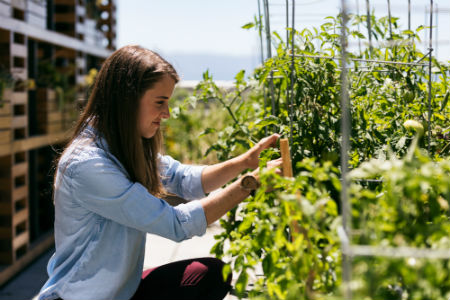Apartment life can feel confining.
Even the most spacious apartment is likely to be without any honest-to-goodness nature within it (except for a few house plants, perhaps). It’s just a feature of living in a multi-unit building such as an apartment or condominium complex.
This has led many to explore alternatives to the traditional backyard garden. For some apartment dwellers, the roof can be accessed for the purposes of tending a garden. From this garden, fresh vegetables and herbs can be harvested, and the garden itself can serve as a kind of sanctuary for those who reside below.
However appealing as a rooftop garden may sound, there’s actually a lot to take into consideration before developing one. There are some potential drawbacks to building a rooftop garden if care is not given to other aspects of the roof.
In this article, the Denver roofing experts at A-to-Z Roofing & Exteriors are exploring the idea of whether or not apartment roof gardens are a good idea, or if they’re more hassle than they’re worth for those living in Colorado.

The Benefits of Rooftop Gardens
Before we decide on a verdict as to whether or not rooftop gardens are a good idea, let’s first consider the benefits they bring. Then, we’ll identify the potential negatives to see how things balance out.
There’s a lot to love about rooftop gardens that are intelligently designed, ergonomic, and accessible. Some of the benefits include:
- Taking advantage of empty space. Instead of there simply being nothing up on the roof, a garden can put that square footage to good use.
- Improving aesthetics. An apartment complex with a garden on the rooftop is going to be less of an eyesore.
- Helping the environment. Most commercial or industrial buildings (including many apartment and condo buildings) have flat or low-slope roofs that do nothing but absorb heat (even though some TPO or PVC membranes can mitigate this somewhat). On a grand scale, these types of roofs contributes greatly to the greenhouse effect that our planet endures. By building a garden on the roof, direct sunlight is used as energy for the growing plants, thus providing a kind of ‘green shield’ for the building as a whole. What’s more, rooftop gardens ‘scrub’ urban air, converting carbon dioxide into oxygen and even removing potentially harmful airborne particles.
- Enhancing privacy. Larger rooftop gardens can even include shade trees and large shrubs, bringing natural comfort and welcomed seclusion from prying eyes.
The Drawbacks of Rooftop Gardens
This all sounds great in theory—and it can be, in practice, too. However, before you rush out to the hardware store with your shopping list, consider the potential challenges that can come with building a rooftop garden:
- The garden may not be allowed. Landlords and/or property owners aren’t always so keen to allow residents to simply start planting things on the roof. There may be city codes or building ordinances that need to be respected in certain areas.
- A rooftop garden may be too heavy for the roof to support. Remember that fill dirt and soil are heavy. So is water. Building a gardening bed or even adding a few potted plants to a rooftop could be potentially dangerous if the roof isn’t capable of supporting the additional weight.
- Water distribution might be a hurdle. Colorado weather is dry much more often than it is humid. This makes many outdoor plants very high-maintenance when it comes to watering. If there isn’t an easy, straightforward way to send water to the roof, the rooftop garden might suffer as a result.
- More sensitive plants may not make it. Rooftops in Colorado get very, very hot. Not only is our atmosphere comparatively thin here, but we also endure a lot more direct sunlight than many other states do. This has the effect of ramping up the heat index on rooftops, something that less hardy plants won’t be able to survive.
- Colorado weather is fickle. High winds, snow, heavy rain, hail and sleet are common throughout most of the year in Colorado. Because of our tumultuous climate, many rooftop gardens simply won’t last longer than a few months without constant tending, depending on what’s growing in them.
The Conclusion? It Depends
So, are apartment roof gardens a good idea for those living in Colorado? The answer is that it depends, case-by-case. In some parts of the state, they’re a fantastic way to add some organic flair and utility to apartment buildings. Conversely, rooftop gardens just aren’t feasible for some locations.
Curious about whether or not your Denver roof could be a candidate for a rooftop garden? Contact us and schedule an on-site roof evaluation.

